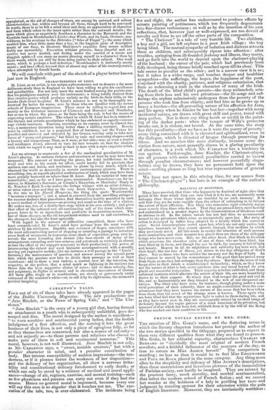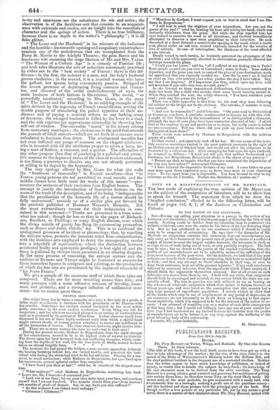FRENCH NOVELS EDITED BY MRS. GORE.
THE sanction of Mrs. GORE'S name, and the flattering terms in which the literary chaperon introduces her protege the author of the two stories specified in the titlepage, prepared us to expect in them very different qualities from what they are found to possess. Mrs. GORE, ill her editorial capacity, characterizes CHARLES DR BERNARD as "decidedly the most original of modern French novelists, and a faithful delineator of the manners of the day, as true to nature as Miss Austen herself." The comparison is startling ; no less so than it would be to find Miss EDGEWORTH and PAUL DE KOCK placed in the same category. Any thing more alien to the simplicity and delicacy of Miss AUSTEN'S descriptions, than these meretricious and licentious pictures of the immoralities of Parisian society, can hardly be imagined. They are tainted by the prurient fancy, mock morality, and morbid sentimentalism, that infect the modern school of French fiction ; and we cannot but wonder at the boldness of a lady in periling her taste and judgment by standing sponsor for their admission within the pale of English literature. Moreover, they are intrinsically worthless : levity and smartness- are the substitutes for wit and satire ; the observation is of the factitious sort that consists in an acquaint- ance with externals and modes, not an insight into the essentials of character and the springs of action. There is no true brilliancy, because there is no depth in the writer's " philosophy " ; it is all false glitter.
"The Lover and the Husband," in its mixture of the ludicrous and the horrible—its romantic opening and sanguinary catastrophe— reminds one of the melodramas that are transplanted from the Porte St. Martin to the Adelphi Theatre ; the grim Baron and his handsome wife assuming the stage likeness of Mr. and Mrs. YATES. "The Woman of a Certain Age" is a comedy of Parisian life ; and both tales illustrate the arts of seduction notoriously practised by either sex in the "best society" of France : there is this dif- ference—in the first, the seducer is a man, and the lady's husband proves vindictive ; in the second, it is a married woman who lures the gallant, her spouse being conveniently passive. Stripped of the covert pretence of depicturing living manners and charac- ter, and divested of the artful embellishments of style, the main business of both fictions is libertinism. The moral, "so powerfully inculcated," according to Mrs. Goan, in the story of " The Lover and the Husband," is an edifying example of the salvo devised by the ingenuity of French vaudevillistes, serving the double purpose of stimulating the palled appetites of their au- diences and of paying a nominal tribute to any lurking sense of decorum : the wronged husband is killed by the lover in a duel, and the wife expiates her approximate criminality by throwing her- self out of window. The ostensible " moral " is the misery arising from mercenary marriages ; the obvious one is the peril that attends the pursuit of illicit amours—which are set forth in a manner more calculated to fascinate than deter. The sentimental moralist has not even inflicted any pangs of remorse on the elegant adulterer ; who is invested with all the attributes proper to adorn a hero, be- ing a man of fashion, a viscount, and a genius. The affectation of any other purpose than that of pandering in a polished and attrac- tive manner to the depraved tastes of the class of readers addressed, is too flimsy a pretence to deceive any one not already perverted or willing to be duped by the hypocrisy.
The very apology offered by Mrs. GORE for what she calls the "frankness of immorality" in French novelists—that "in France, young persons are not permitted to read novels, and the middle classes have little taste for works of this nature "—pro- nounces the sentence of their exclusion from English homes. The attempt to justify the introduction of licentious fictions on the score of the truth of the description, and of its being "indispensable that the peculiarities of the domestic life of a nation should be fully understood," reminds us of a similar plea put forward by the patriotic publisher of HARRIET WILSON'S Memoirs. But the most extraordinary excuse for their indecencies is con- tained in this sentence—" Truths are presented in a form some- what too naked ; though far less so than in the pages of Richard- son, Smollett, or Fielding; or many English dramas, over which the divine mantle of poetry has flung its extenuating protection, such as Romeo and Juliet, Othello," &c. This is to confound the undisguised grossness of incident or phraseology, that, by repelling the delicate sense, protects the innocent mind from contamination, with the insidious arts employed to decoy the unsuspecting reader into a labyrinth of equivocation, where the distinction between accidental frailty and systematic profligacy is lost sight of, and the fancy is polluted by vicious ideas presented in an alluring disguise. By the 'same process of reasoning, the antique statues and the nudities of RIIBENS and TITIAN might be instanced as excuses for those immodest figures in sculpture and painting, to the production of which the fine arts are prostituted by the depraved coxcombs of "La Jeune France."
We give a sample of the nauseous stuff of which these tales are composed. There are far more revolting scenes than this ; and many passages with a more offensive mixture of frivolity, loose- ness, and profanity, and a stronger infusion of sublimated non- sense : but we cannot quote them.
FRENCH SEDUCTION.
One might fancy her by turns a coquette or a nun, a fine lady or a prude, a fallen angel or a cherub, a dutchess with her precedence or St. Theresa with her crucifix. Sometimes her conduct seemed instigated by the most selfish pride, sometimes by the most exalted tenderness. Every thing was left for conjecture; and her admirers remained plunged in an ecstasy of contemplation such as is produced by the portrait of Mona Lisa. A close observer would have discerned in her one of those highly-endowed souls from which a skilful hand might extract chords of human passion calculated to render one indifferent to all the harmonies of heaven. The close observer, however, might deceive him- self. There are so many women who have no soul—but in their eyes ! During her present reverie, Madame de Bergenheim, from the rapid changes of her countenance, seemed to be in the highest state of mental excitement. The frown upon her brow betrayed dark and conflicting thoughts, which, rush- ing from the depths of her soul, like the blue devils of Stello, seemed to have
taken an almost tangible form. • * * •
The moment she had passed the bridges, a man, meanly apparelled, followed. On hearing footsteps behind her, she turned hastily, and perceived the indi- vidual who during the storm had tried to fix her attention. Pausing for a mo- ment, he stood motionless; while Madame de Bergeuheim, her eyes fixed upon his movements, seemed agitated rather than surprised. "1 have found you then at last ! " cried he, in accents of the deepest emo- tion.
"What madness !" cried Madame de Bergenheim, motioning him back. "Leave me, Sir, I beseech—I command you."
"Look not at me thus ; let me gaze once more upon your face, and convince myself that I am not deceived. Two months absent from you—from heaven ! two months of grief—of despair. Say, oh say, have you also suffered 2" "At this moment I am indeed most unhappy."
" Clemence I Clemence !"
"Monsieur de Gerfaut, I must request you to bear in mind that I am Ma- dame de Bergenheim." "I will bear in mind the slightest of your injunctions. Are you not the queen of my soul 2" cried he, bending his knee and seizing her hand, which was instantly withdrawn from his grasp. But while she thus repelled him, her eyes seemed to examine the wood in all directions ; and Gerfaut immediately attempted to discover a spot more propitious to their interview. He soon discerned at a short distance a semicircular opening in the wood, where a rustic seat, placed under an oak tree, seemed expressly intended for the votaries of love or solitude. In case of interruption, the thickness of the wood afforded a sure retreat.
Deeply versed in such tactics, he instantly perceived the advantages of the position ; and while apparently absorbed in conversation, gradually directed her footsteps towards the place. "Could you but know," said he, "all I suffered at not finding you in Paris I Some people assured me you were at Corandeuil; some, in Italy. Your sudden departure, and the pains you took to conceal the place of your destination, made me apprehend that you expressly avoided me. Can this be true ? or, if indeed so cruel an idea ever entered your mind, pardon the step I have taken. Say, say that I am forgiven ! If I importune you thus, reflect upon my love, rash and senseless if you will—but true, devoted, pure!"
As she listened to these impassioned declarations, Cl6mence continued to shake her head, like a child who shrinks from some insect buzzing around it When they reached the seat, she coldly observed, "You have mistaken your road ; your way lies across the bridge." There was a little hypocrisy in this hint, for the road they were following led neither to the bridge nor to the château. The mistake, if mistake it were, was mutual. • "And now be reasonable!" said Clemence. "On your road to Switzerland or Germany, you have, I conclude, condescended to honour me with this visit. I ought to feel flattered by the remembrance of so distinguished a character, although the rays of your glory have been somewhat obscured of late. I admit that in the country we are not particular as to dress, but really yours is rather too unceremonious. Tell me, where did you pick up your rustic weeds and distinguished head-dress ?" These words were uttered by Madame de Bergenheim with the reckless gayety of a child.
Gerfaut smiled ; and sportively took off his hat. He was aware of the inde- lible aversion sometimes excited in the most pathetic moments by the sight of an ill-tied cravat or ill-blacked boot, and would not allow his eloquence to be frustrated by a ridiculous bat. After arranoing his hair upon his open forehead, he resumed as follows : " I need not tell you that neither Switzerland nor Germany, but Bergenbeim, Bergenheim alone, is the object of my journey." "Permit me then to inquire whether you have considered the imprudence of the step you have taken ?" interrupted Cl6mence. "I have followed the imperative dictates of my soul. I came hither to gaze once more upon those expressive eyes, to listen once more to your charming voice. To live apart from you is impossible. You have become as vital to my existence as the am I breathe. Pardon me, therefore, oh ! pardon me."



























 Previous page
Previous page